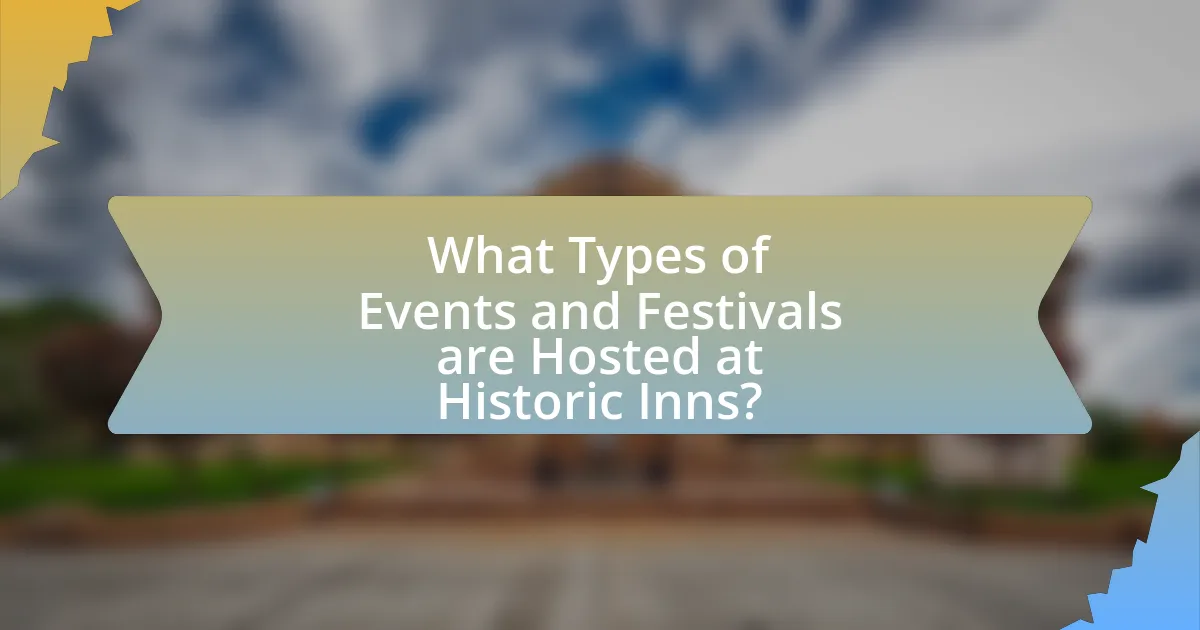Historic inns are accommodations of historical significance that serve as cultural hubs within their communities. They host a variety of events and festivals that celebrate local traditions, heritage, and arts, thereby fostering community engagement and preserving regional culture. These inns contribute to local economies by attracting tourism and providing unique experiences through culinary events, seasonal festivals, and historical reenactments. The article explores the role of historic inns in promoting cultural exchange, supporting local artisans, and enhancing visitor experiences, while also detailing the types of events commonly held at these venues.

What are Historic Inns and Their Role as Cultural Hubs?
Historic inns are accommodations that have historical significance, often reflecting the architectural styles and cultural heritage of their time. They serve as cultural hubs by hosting events, festivals, and gatherings that celebrate local traditions and history. For example, many historic inns participate in community events such as harvest festivals or historical reenactments, which attract visitors and foster a sense of community. Additionally, these inns often feature local art, cuisine, and storytelling, further enhancing their role as centers of cultural exchange and preservation.
How do Historic Inns contribute to local culture?
Historic inns contribute to local culture by serving as venues for community events, preserving historical architecture, and promoting regional traditions. These establishments often host festivals, art shows, and cultural gatherings that engage local residents and visitors alike, fostering a sense of community and shared heritage. For example, many historic inns are located in areas with rich histories, and their architecture reflects the local style, which helps to educate guests about the region’s past. Additionally, by featuring local cuisine and artisans, historic inns support and showcase regional culture, making them integral to the cultural landscape.
What historical significance do these inns hold in their communities?
Historic inns serve as vital cultural and historical landmarks within their communities, often reflecting the architectural styles and social dynamics of their respective eras. These establishments frequently acted as gathering places for local events, fostering community ties and preserving regional traditions. For instance, many historic inns have hosted significant events such as town meetings, weddings, and festivals, which have contributed to the local heritage and identity. Their continued operation often supports local economies and tourism, reinforcing their role as essential components of community history and culture.
How do they preserve local traditions and heritage?
Historic inns preserve local traditions and heritage by hosting cultural events, festivals, and workshops that celebrate regional customs. These establishments often serve as venues for traditional music, dance, and culinary experiences, allowing visitors to engage with the local culture. For example, many historic inns organize seasonal festivals that feature local artisans, showcasing crafts and foods unique to the area. This not only promotes community involvement but also educates guests about the historical significance of these traditions, ensuring their continuity for future generations.
Why are Historic Inns considered important for tourism?
Historic inns are considered important for tourism because they serve as cultural hubs that provide unique experiences reflecting local history and heritage. These establishments often feature architecture and decor that showcase the region’s past, attracting visitors interested in authentic cultural experiences. For instance, many historic inns host events and festivals that celebrate local traditions, cuisine, and arts, further enhancing their role in tourism. According to the National Trust for Historic Preservation, historic inns contribute significantly to local economies by attracting tourists who spend money on accommodations, dining, and activities, thereby supporting the broader tourism industry.
What unique experiences do they offer to visitors?
Historic inns offer visitors unique experiences such as immersive cultural events, themed festivals, and historical reenactments. These establishments often host seasonal celebrations that reflect local traditions, providing guests with opportunities to engage in activities like traditional cooking classes, craft workshops, and guided historical tours. For example, many historic inns participate in regional festivals that showcase local artisans, musicians, and culinary specialties, allowing visitors to experience the area’s heritage firsthand. Additionally, some inns may offer exclusive access to historical artifacts or storytelling sessions led by knowledgeable staff, enhancing the cultural experience for guests.
How do they enhance the local economy through tourism?
Historic inns enhance the local economy through tourism by attracting visitors who spend money on accommodations, dining, and local attractions. This influx of tourists generates revenue for local businesses, creates jobs, and stimulates economic growth. For instance, a study by the National Trust for Historic Preservation found that heritage tourism contributes over $1 billion annually to local economies in the United States, demonstrating the significant financial impact of historic inns as cultural hubs.

What Types of Events and Festivals are Hosted at Historic Inns?
Historic inns host a variety of events and festivals, including weddings, holiday celebrations, culinary festivals, and historical reenactments. These venues often provide a unique atmosphere that enhances the experience of such gatherings. For example, many historic inns celebrate local culture through food and wine festivals, showcasing regional cuisine and beverages. Additionally, they may organize seasonal events, such as Christmas markets or summer fairs, which attract both locals and tourists. Historical reenactments at these inns often draw on the rich history of the location, providing educational and entertaining experiences for attendees.
What are the most common types of events held at these inns?
The most common types of events held at historic inns include weddings, corporate retreats, and community festivals. Weddings are frequently hosted due to the picturesque settings and unique atmospheres that these inns provide, making them ideal for couples seeking a memorable venue. Corporate retreats often utilize the serene environments of historic inns for team-building activities and meetings, allowing for a productive yet relaxed atmosphere. Additionally, community festivals are regularly organized at these inns, celebrating local culture and heritage, which attracts both locals and tourists, thereby enhancing the inns’ role as cultural hubs.
How do seasonal festivals reflect the culture of the region?
Seasonal festivals reflect the culture of a region by showcasing its traditions, values, and community identity. These events often incorporate local customs, music, food, and art, which serve as expressions of the region’s heritage. For example, the Harvest Festival in New England celebrates agricultural practices and local produce, highlighting the importance of farming in the community’s history. Additionally, festivals like Carnival in Brazil emphasize cultural diversity and social unity, drawing on African, Indigenous, and European influences. Such celebrations not only foster community engagement but also attract tourism, further embedding the cultural significance of these festivals within the region’s identity.
What role do culinary events play in showcasing local cuisine?
Culinary events play a crucial role in showcasing local cuisine by providing a platform for chefs and food producers to present traditional dishes and ingredients unique to a region. These events often highlight local flavors, cooking techniques, and cultural heritage, allowing attendees to experience the authenticity of the cuisine. For instance, festivals like the Taste of Chicago or the San Francisco Street Food Festival feature local chefs who prepare dishes using regional ingredients, thereby promoting local agriculture and culinary traditions. Such events not only enhance community pride but also attract tourism, contributing to the local economy.
How do Historic Inns collaborate with local communities for events?
Historic inns collaborate with local communities for events by hosting and promoting local festivals, workshops, and cultural gatherings. These establishments often serve as venues for community events, providing space and resources that enhance local traditions and tourism. For instance, many historic inns partner with local artisans and businesses to organize craft fairs or food festivals, which not only attract visitors but also support the local economy. Additionally, they may offer packages that include accommodations and event tickets, further integrating their services with community activities. This collaboration fosters a sense of community pride and preserves local heritage, making historic inns vital cultural hubs.
What partnerships are formed between inns and local organizations?
Inns often form partnerships with local organizations such as tourism boards, cultural institutions, and community event planners. These collaborations enable inns to host events, promote local culture, and enhance visitor experiences. For example, historic inns may partner with local arts councils to showcase regional artists or with food festivals to feature local cuisine, thereby attracting more guests and fostering community engagement. Such partnerships not only benefit the inns through increased visibility and customer traffic but also support local economies and cultural preservation efforts.
How do these collaborations enhance the event experience?
Collaborations enhance the event experience by integrating diverse cultural elements and resources, which enriches the overall atmosphere. For instance, partnerships between historic inns and local artists or musicians can create unique performances that reflect the region’s heritage, attracting a wider audience. Additionally, these collaborations often lead to innovative programming, such as themed events or workshops, that engage attendees more deeply. Research indicates that events featuring collaborative efforts see increased participant satisfaction and higher attendance rates, as they offer a more immersive and varied experience compared to standalone events.

What are the Benefits of Experiencing Events at Historic Inns?
Experiencing events at historic inns offers unique benefits such as immersion in local culture, enhanced historical appreciation, and distinctive atmospheres. Historic inns often serve as cultural hubs, providing guests with access to local traditions, cuisine, and art, which enrich the overall experience. For instance, events held at these venues frequently highlight regional history and heritage, allowing attendees to engage with the past in a meaningful way. Additionally, the architectural charm and ambiance of historic inns create a memorable setting that enhances social interactions and networking opportunities among guests.
How do events at Historic Inns foster community engagement?
Events at Historic Inns foster community engagement by providing a platform for local residents to connect, collaborate, and celebrate their shared heritage. These events often include cultural festivals, workshops, and social gatherings that encourage participation from diverse community members. For instance, a study by the National Trust for Historic Preservation highlights that such venues serve as focal points for local culture, enhancing social cohesion and community identity. By hosting events that reflect local traditions and history, Historic Inns not only attract visitors but also strengthen ties among residents, fostering a sense of belonging and pride in their community.
What opportunities do they create for local artisans and performers?
Historic inns create opportunities for local artisans and performers by providing a platform for showcasing their work through events and festivals. These venues often host art exhibitions, craft fairs, and live performances, allowing artisans to sell their creations and performers to reach new audiences. For instance, events like local craft markets held at historic inns can attract visitors, increasing foot traffic and sales for artisans. Additionally, partnerships between inns and local artists can lead to collaborative events that enhance cultural engagement and community support, fostering a vibrant local arts scene.
How do these events promote cultural exchange among attendees?
Events at historic inns promote cultural exchange among attendees by providing a platform for diverse cultural interactions and shared experiences. These gatherings often feature local traditions, cuisines, and art forms, allowing participants to engage with different cultural practices firsthand. For instance, festivals may include performances of traditional music and dance, workshops on local crafts, and tastings of regional dishes, which facilitate direct engagement and learning. Additionally, the communal atmosphere encourages conversations and connections among attendees from various backgrounds, fostering mutual understanding and appreciation of different cultures.
What tips can visitors follow to make the most of their experience?
Visitors can enhance their experience at historic inns by participating in local events and festivals. Engaging in these activities allows visitors to immerse themselves in the culture and history of the area, fostering a deeper connection to the community. For instance, many historic inns host seasonal festivals that showcase regional cuisine, crafts, and traditions, providing authentic experiences that reflect the local heritage. Additionally, visitors should consider scheduling guided tours offered by the inns, which often include historical insights and stories that enrich the visit. Research indicates that interactive experiences, such as workshops or cooking classes, significantly increase visitor satisfaction and engagement, making these activities valuable for a memorable stay.
How can one find out about upcoming events at Historic Inns?
To find out about upcoming events at Historic Inns, individuals can visit the official websites of the inns, where event calendars are typically posted. Many Historic Inns also utilize social media platforms to announce events and engage with the community, providing real-time updates. Additionally, subscribing to newsletters from these inns can ensure that one receives direct notifications about upcoming events. This approach is effective as it allows for timely access to information regarding cultural activities and festivals hosted at these venues.
What should visitors consider when planning to attend an event?
Visitors should consider the event’s schedule, location, and accessibility when planning to attend. Understanding the timing ensures they can participate in all activities, while the location impacts travel arrangements and accommodations. Accessibility is crucial for ensuring that all attendees can comfortably reach and enjoy the event. Additionally, researching the event’s cultural significance and any associated historical context can enhance the overall experience, as events at historic inns often celebrate local traditions and heritage.